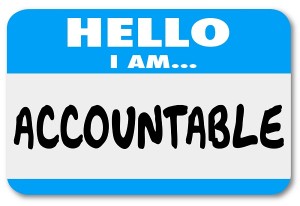Some favorite sayings o f small children are: “It’s not my fault…they made me do it…I forgot.” Some favorite sayings of small adults are: “It’s not my job…No one told me…It couldn’t be helped.” Dan Zadra said, “True freedom begins and ends with personal accountability.” If this is true for us as individuals, it is doubly true for us as leaders. Kouzes and Posner stated that “when people take personal responsibility and are held accountable for their actions, their colleagues are much more inclined to want to work with them and are more motivated to cooperate in general.”
f small children are: “It’s not my fault…they made me do it…I forgot.” Some favorite sayings of small adults are: “It’s not my job…No one told me…It couldn’t be helped.” Dan Zadra said, “True freedom begins and ends with personal accountability.” If this is true for us as individuals, it is doubly true for us as leaders. Kouzes and Posner stated that “when people take personal responsibility and are held accountable for their actions, their colleagues are much more inclined to want to work with them and are more motivated to cooperate in general.”
For leaders this is a message not only of personal accountability, but also of giving others roles and responsibilities that they themselves are held accountable for. For some leaders this can mean relinquishing some power. As leaders we have to find those in our team (or outside it, if necessary) who have expertise and can make contributions in specific areas, which can only strengthen to the entire team. Leaders who worry that others will not be able to do a given job as well, as efficiently, or as fast as they can themselves, and therefore end up doing it themselves, court failure as leaders. As Ana Aboitiz is quoted in The Leadership Challenge; “In order to foster accountability, you need to delegate authority and give others a chance to take responsibility.” By trusting others with responsibility you are communicating your belief in them and your confidence in their abilities.
Kouzes and Posner have come up with the following ideas for fostering individual accountability:
- Make certain that everyone in your organization, no matter the task, has a customer. The customer can be internal or external, but each person needs to know whom he or she is serving.
- Subsequently increase signature authority at all levels.
- Remove or reduce unnecessary approval steps.
- Eliminate as many rules as possible.
- Decrease the amount of routine work.
- Automate routine work wherever possible.
- Assign non-routine jobs.
- Support the exercise of independent judgement.
- Encourage creative solutions to problems.
- Define jobs more broadly – as projects, not tasks.
- Provide greater freedom of access, vertically and horizontally inside and outside.
Finally, accountability is not about abdicating personal responsibility by throwing it on to others. It starts with us as leaders. We have the ultimate accountability for our team—we are responsible for results and outcomes. By demonstrating accountability we foster increased trust and cooperation, which in turns creates great leadership.
